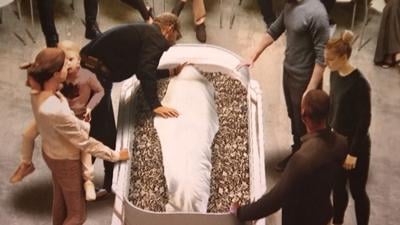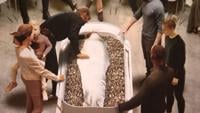LAUREL, DE -- Delawareans in Sussex County have strong opinions about the alternative burial practice of composting human bodies potentially becoming legal in the First State.
Human composting is an organic process that decomposes human remains in a tank, with woodchips and straw in as few as 30 days. The human remains and organic materials would mix with warm air and be periodically turned until the body is reduced to a soil-like material that can then be given to the dead person’s family.
Human composting is currently legal in Washington, Colorado, Oregon, Vermont, California, New York and Nevada, and legislation has been introduced in more than a dozen other states.
Supporters of the practice say it is an environmentally friendly and less costly alternative to traditional burials and cremation that uses less energy and doesn’t involve the use of formaldehyde or the release of carbon dioxide and mercury into the atmosphere.
"People want to keep their loved ones around as long as they can, so composting would probably give you a lot more time with them," says Laurel resident Donald Warnick.
They also say it will help reduce the amount of land needed for cemeteries and the amount of timber harvested for caskets.
"Cemeteries are taking up too much ground," says Laurel resident Michel Reynolds. "They're expensive, they're a burden to the people that are left. As long as they are handled in a respectful way, I think human composting is a good idea."
However, the benefits are not enough to garner everyone's support.
"Someone that's passed deserves something that would be a little more dignified than to just be placed in the dirt and be decomposed that way", says Jerry White.
"It just don't sound good to me to bury someone in the cold, cold ground," Roger Little says. "It's bad enough being in a box. When they cremate you, they leave you in a bowl. There's nothing left of you."
Under the bill, remains could not be accepted for composting if they contain radioactive implants, or if the person died as the result of a radiological incident. Also off-limits would be the remains of those suspected of having certain infections, such as the Ebola virus or diseases that can affect both animals and humans and lead to incurable neurodegenerative disorders, such as mad cow disease.
If the bill is enacted into law, state officials would have up to a year to develop specific regulations.
WBOC reached out to Governor John Carney's office to ask whether he plans to sign the bill into law. A spokesperson tells us the bill is under legal review.



